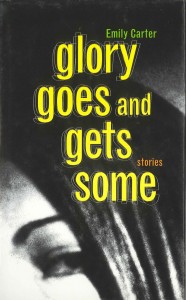Emily Carter spends a lot of time, in Glory Goes and Gets Some, playing with ideas about who has the right to pain. I suspect that inside many of us there’s a voice that says me, I’m the one with the problems, pay attention to me, along with a conviction that we will lose out if we’re not the saddest person in the room. Carter actually invites you to do this. She pushes your buttons, pisses you off, gets you to actively dislike her protagonist Glory until finally she turns around and slaps you full force with what Glory’s been through.
Glory is holding a good hand in this particular game. She’s been beaten by her first husband, been addicted to several controlled and uncontrolled substances, been fucked cruelly to pay for them, been diagnosed with HIV, been put through rehab, and has lost New York and an “intellectual” family and a punk rock lifestyle, in favor of a recovery-centric existence in the Midwest. These are serious problems. If you were foolish enough to get into a competition with Glory, over who had the most serious problems, you might lose.
But Carter doesn’t bother with the competition. In fact, she flat-out rejects it, along with the idea that Glory’s suffering deserves special reverence. She constantly reminds us that Glory does not come from “real” sadness, that she comes from a world that was able to front the cost of her self-destruction for a time, that this background has also offered her the option of recovery. She more than touches on the idea that other stories turn out differently, that for many people the options of rehab and treatment and the Midwest do not exist. Without poor-me penitence, she keeps the reader aware that a great many of the decisions Glory made were bad ones, decisions which hurt not just Glory, but anyone who happened to be standing within the blast radius, when she took the pin out of whichever grenade she was holding. Carter says as much directly, at times. But other times she is just, frankly, trying to irritate you: When drunk Glory is mopped off the floor by a neighbor, she takes the time to note the cheapness of the woman’s dress in her wedding photos. When she visits an old man: “His apartment was a surprise: It was not at all the dank, mildewed coven I had expected. In fact it was tastefully furnished. Of course by tastefully furnished I mean not furnished in the style of the working class. That’s the kind of evil fascist I am. I doubt there’s any hope for me.”
When Glory describes the first husband who beat her up, it doesn’t sound like the usual story about domestic violence and its aftermath. It sounds like this:
I do remember that he cheated on me constantly, and I was obsessed with how bad that made me look. So I’d cheat on him, in between getting fired from various jobs for bookkeeping errors and tardiness. I’d find him in our bed with some girl when he thought I was still in the hospital with a kidney infection and break a plate over his head. He’d think I was screwing his best friend and black both my eyes. He’d leave me and walk down the block, righteous. I’d follow him, begging and pleading. I’d go back to New York, he would call and write and beg and plead. I would call and write and beg and plead with my poor mother to send me the airfare back out for another round. “Mom,” I’d whine and badger, my voice a vicious squeak, “you have to or I’ll die. Die. I mean it. Do you want me to die, you probably do, but give me the money anyhow.”
And then, she spends quite a lot of time blaming and ridiculing said mother.
The book tries to throw you, and not just in this one way: Carter is what you might call a “difficult writer,” someone who flips through different modes and voices very quickly, who starts the book off with a dense prose poem, flips to a conversational anecdote, and then suddenly includes a strange urban fantasy story about an unfrozen sailor, all within its first section. The book doesn’t want you sticking around, if you’re not prepared to deal with it.
That lead-off prose poem is a bit too showy and overwritten, too much like a drumroll announcing that You Are Now Reading A Book. Carter relies too heavily on one or two stylistic maneuvers. The trick of having a character start off speaking conversationally, then slip into a burst of lyricism — “‘Pennsylvania,’ she states incorrectly. ‘I live in Pennsssylvannia…the barns red and dark as old men’s blood, and the steel mills thundering all night in the city, shooting showers of white-gold sparks’”— is one that eventually wears a bit thin. It’s particularly disappointing given how great she is at dialogue, as if she’s not quite sure you buy her as a writer and wants to show you all the neat things she can do. Compare the old-guy blood barns of Pennsylvania to this line: “During his last relapse Dooley had fallen through Zemecki’s window, saying, ‘I want to be sober, but I’m drunk. So ok, there’s a dichotomy there.’”
But I’m not too sad for Glory, or scared for Carter, to admit that the quibbles I’ve just listed constitute my grand total of three problems with the book. (Well, four. I also think she’s too cruel to Glory’s mother, who did after all have to take those phone calls.) I could be more delicate, I could easily be cowed into delicacy. If Carter wanted to play that game — if she presented Glory as fragile, or martyred; or, if Carter herself seemed less self-aware and in control as a writer, if the book read like an exorcism instead of a carefully ordered and structured work– she would win. She’s not playing. Carter is not interested in receiving a single scrap of sympathy for Glory that she hasn’t fully earned.
A lot of the book’s value lies in what it puts you through: the way it drags you from drunk Glory being mopped off the floor by a social worker she feels somehow equipped to judge, through Glory in the rooming-house, moneyless, hearing the blare of the TV and her own hopelessness, through and past Glory, to everyone else, to people just as surely and profoundly and permanently injured as she is. Finally we meet a man who has nothing, really, not a lot to look forward to, just a cat, and who, when the cat is shot to death in someone else’s gunfight, sits there and tells himself not to overreact: “People lose children in this kind of thing. Children.”
Who cares, when you’ve lost everything, what “everything” was? Or whether someone else lost a different everything, at some point in time? When has that ever actually mattered, to anyone? Yes, it’s true, my entire family was killed yesterday in a plane crash. However, I immediately turned to browsing these accounts of notable war atrocities, as one does, and have decided their various untimely deaths were actually not that bad! When, in the history of human tragedy, has that line of reasoning ever worked? It doesn’t matter, when you lose everything, what you had before you lost it. What matters is that you lost it, and that it was all you had.
Carter refuses to stop until Glory has lost everything. She seems to hit bottom so many times, throughout this book, that when it actually does rise up and hit her — it’s when she seems to be pulling up; it’s right after the book’s biggest laugh line; be careful — the reader is knocked sideways. The last time we see Glory, she is refusing to ever be forgiven. And we can see why.



